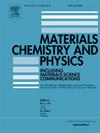Morphology-dependent magnetic hyperthermia characteristics of Fe3O4 nanoparticles
IF 4.3
3区 材料科学
Q2 MATERIALS SCIENCE, MULTIDISCIPLINARY
引用次数: 0
Abstract
Magnetic hyperthermia therapy (MHT) represents an innovative approach to cancer treatment, harnessing the therapeutic capabilities of magnetic nanoparticles. Fe3O4 nanoparticles are often considered ideal candidates for MHT because of their biocompatibility. However, the clinical application of Fe3O4 nanoparticles is hindered by their low heating efficiency and concerns regarding potential toxicity linked to the high concentrations required to achieve therapeutic effects. In this study, two unique structures, hollow spherical and nanoflower Fe3O4, were successfully synthesized to enhance their magnetothermal conversion efficiency. The results indicate that Fe3O4 nanoflowers exhibit an intrinsic loss power (ILP) value of 6.52, which is 1.83 times greater than the ILP of hollow spherical Fe3O4 (3.55), indicating its enhanced potential for MHT applications. The COMSOL simulation demonstrated that higher magnetic field frequencies and intensities elevate tissue temperature and damage in tumor cells, particularly at 100 kHz and 400 kHz, with tumor tissue damage scores rising to 0.28 and 0.93, respectively. Shorter heating durations, such as 6 min, minimize harm to healthy tissue and are ideal for treatments requiring multiple sessions. After 12 min, tumor scores rose to 0.85, while normal tissue scores were 0.34, suggesting that longer durations improve therapeutic effects on tumors but also heighten the risk to healthy cells. This research provides a scientific foundation for selecting materials in the context of MHT for cancer treatment, potentially paving the way for more effective and safer therapeutic strategies.
取决于形态的 Fe3O4 纳米粒子磁热特性
磁热疗法(MHT)是利用磁性纳米粒子的治疗能力治疗癌症的一种创新方法。由于具有生物相容性,Fe3O4 纳米粒子通常被认为是磁热疗法的理想候选材料。然而,Fe3O4 纳米粒子的加热效率较低,而且要达到治疗效果所需的高浓度可能会产生毒性,这些因素都阻碍了它在临床上的应用。本研究成功合成了中空球形和纳米花形两种独特结构的 Fe3O4,以提高它们的磁热转换效率。结果表明,Fe3O4 纳米花的本征损耗功率(ILP)值为 6.52,是空心球形 Fe3O4 的 ILP 值(3.55)的 1.83 倍,表明其在磁热转换应用中的潜力得到了增强。COMSOL 仿真表明,较高的磁场频率和强度会提高肿瘤细胞的组织温度和损伤程度,尤其是在 100 kHz 和 400 kHz 时,肿瘤组织损伤评分分别升至 0.28 和 0.93。较短的加热持续时间(如 6 分钟)可最大限度地减少对健康组织的伤害,是需要多次治疗的理想选择。12 分钟后,肿瘤评分上升到 0.85,而正常组织评分为 0.34,这表明较长的持续时间可提高对肿瘤的治疗效果,但也会增加对健康细胞的风险。这项研究为选择MHT治疗癌症的材料提供了科学依据,有可能为更有效、更安全的治疗策略铺平道路。
本文章由计算机程序翻译,如有差异,请以英文原文为准。
求助全文
约1分钟内获得全文
求助全文
来源期刊

Materials Chemistry and Physics
工程技术-材料科学:综合
CiteScore
8.70
自引率
4.30%
发文量
1515
审稿时长
69 days
期刊介绍:
Materials Chemistry and Physics is devoted to short communications, full-length research papers and feature articles on interrelationships among structure, properties, processing and performance of materials. The Editors welcome manuscripts on thin films, surface and interface science, materials degradation and reliability, metallurgy, semiconductors and optoelectronic materials, fine ceramics, magnetics, superconductors, specialty polymers, nano-materials and composite materials.
 求助内容:
求助内容: 应助结果提醒方式:
应助结果提醒方式:


